#overly complex operation
Video
youtube
(via A Tour of The Farfisa Super Synthaccordion)
the most complex fucking thing I’ve seen in quite some time
#youtube#Farfisa Super Synthaccordion#vintage#musical instrument#so many parameters and features#overly complex operation
15 notes
·
View notes
Note
I confess, I've never retained much interest in Martin but I think that's mainly because his fanon analogue has always cringed me in a way but during my re-listening to the podcast I realized how fucking complex he is. Dude exploits the underestimation that everyone imposes on him but ends up that he also underestimates his own capacity for harm, like he's not even making an effort to do good just as the fandom believes he's just terribly alone and never had many opportunities to do evil and I think that's a reality for a lot of lonely people out there actually. That's a really interesting concept for a character, I'd love to see more of it.
I don't think it's quite right to say he's not making an effort to try and do good, there are clearly a few points in seasons two and three where he kind of assigns himself the role of the archive den mother and tries to keep everyone from falling apart, but I think his relationship with caring for people is more fraught than a lot of people give him credit for. on the one hand, he has a very pure altruistic motive of wanting everyone to be okay, and he does try to work towards that, but on the other hand that motive can become overly simplistic and make him start operating on a very good guys vs bad guys moral code. there have also been very few times when caring for people has actually been his choice, and that can both make him feel completely inept at acting on his own and, on occasion, explosively angry and resentful at the people/situations he's trying to help.
there's a counter to that "power corrupts, absolute power corrupts absolutely" aphorism that goes like "power reveals; if you give a guy the power to do anything he wants then you'll see what the guy always wanted to do," and for martin, the thing he always wanted to do was make everybody safe and happy so he could stop being so constantly terrified. when he realizes there's no way to configure the world so that everyone's happy, he tries to convince himself that hurting the people he hates must be somehow helpful to everyone else, and rejects the idea that he has any power at all.
99 notes
·
View notes
Text
@inukag-week | InuKag Week 2024 | Yearning
Summary: Inuyasha had a craving for ramen after Kagome’s return and Kagome tried to deliver. | Also on Ao3

Staring down at the steaming bowl of stew Kagome had presented him, Inuyasha tried to keep his expectations in check. Tried being the operative word here because, in the years Kagome was gone, he’d tried - oh how he tried - to recreate the taste of those sinful noodles. He had missed ramen almost as much as he missed the woman that was now his wife. The combination of spices, the texture of the noodles, and the comforting warmth had been unlike anything he had ever tasted. No matter how hard he tried, though, he couldn't replicate the complex flavors with the ingredients available in his time. He couldn’t even get close to the smell.
It was Kagome’s damn fault for introducing the salty futuristic bastards in the first place. She should’ve known better than to give him a taste of the finer things in life. Things that were quite literally impossible to get without her.
But, but this particular stew smelled close or, at least, close enough. There weren’t noodles, sure, but beggars couldn’t be choosers and it was the broth that really stole the show anyway. As the stew had simmered, Inuyasha’s expectations had reached dangerously high levels. Now the moment arrived. God, if Kagome really had managed to recreate it, they could put that broth in everything.
Hesitant but hopeful, he took a tentative sip.
He barely repressed his gag. Despite the scent being on point, the flavor and consistency was not. The piss poor stew was overly salty, the spices were unbalanced and dear god, there just weren’t enough insults in the world to describe the after taste. Even ass wasn’t good enough. Something, somewhere had gone horribly, horribly wrong. Despite the nauseating concoction making him want to puke, Inuyasha looked up at Kagome’s eager face and couldn't bring himself to dampen her enthusiasm. Against his better judgment, he took another sip and immediately regretted it but nothing was off the table when it came to protecting Kagome in every possible way so, with god as his witness, he was going to finish this before coming up with some excuse and leaving to go puke it up in the woods.
“Do you not like it?” Kagome asked worried as she wrung her hands, “I know there aren’t noodles but I thought the smell…”
“Nah, s’good woman. Quit your worrying,” he mumbled hoarsely before steeling himself and knocking back the whole bowl to get it over with.
That…oh boy…that was a mistake.
“Think…” a bit of vomit filled his mouth that he quickly swallowed down, “Think somethin’ in…” a gag he couldn’t repress as a cold sweat broke out. He stumbled towards the door and prayed, “Woods,” the world began to spin, “Stay. Be back.”
“Inuyasha, wait-“
He ran begging for this feeling to pass because his damn woman was too smart for her own good and would definitely get pissed at him despite this being entirely her fault. Three long years waiting for his woman to finally get her pretty face back here only for him and his stupid ass was managing to ruin everything over ramen.
Figures.
The agony building in his stomach hit new levels when he tried to launch. The jolt then rapid ascent nearly had him spewing everywhere.
God, what did she use?!
The landscape around him had melted and his ears were ringing by the time he finally, mercifully made it into the woods. Unable to hold it in any longer, Inuyasha doubled over and vomited violently by a cluster of trees. The harsh taste of the stew mixed with the bitter bile, and he retched again, emptying his stomach. Over and over and over again because the persistent, nauseating taste lingered.
His breathing became ragged and labored between bouts of retching. His normally top notch vision blurred. Each wave of sickness seemed more intense than the last, leaving the hanyou who could toss demons ten times his weight trembling and drained until the convulsions eventually subsided and he stumbled over to a nearby tree to simply collapse.
If he didn’t know better, he would’ve said Kagome had just tried to kill him. He didn’t even have the strength to move further away from the putrid stench that had his stomach churning all over again. Another trickle of vomit bubbled over his lips. His mind screamed at him to black out and free him from this torment.
“That bad, huh?” Kagome’s nervous chuckle came from far too close and bleary golden eyes blinked open to find his wife kneeling in front of him.
Ah shit. So much for keeping how utterly disgusting that thoughtful attempt really was. Dumb woman. Following him. Her fault if she got her feelings hurt.
“What the hell did you put in that?” he mumbled miserably as Kagome gently grabbed his hands and helped him to his feet. She draped one of his arms around her shoulder and together they began the journey back.
“Chicken broth. Um some herbs. Vegetables. Some mushrooms I found and-“
Inuyasha sent her a miserable glare as something clicked. He immediately made a mental note to have Kaede teach Kagome about plants in general not just medicinal herbs because this whole fiasco could’ve been ten times worse.
“What the mushrooms look like?”
“They were just normal white mushrooms,” Kagome clipped defensively and Inuyasha wrinkled his nose.
“Did you eat any of that shit?” he asked - god his voice was so raw.
“Well no, I wanted to-“
“Do not eat that shit until you show me what mushroom you used,” Inuyasha muttered before his stomach decided to convulse again. Another dribble of bile found its way onto his robe before the ground came up to meet him.
By the time he reopened his eyes, Kagome was kneeling there looking guilty as hell. Her hands smoothed out a few wrinkles of her kimono like she was trying to buy time.
“Okay, so, don’t get mad-”
Inuyasha snorted softly as he rolled his sore body into its side and listened to his wife nervously explain that she might’ve accidentally kinda sorta poisoned him because she didn’t know how to identify poisonous mushrooms for what they were. An innocent mistake and thankfully one that didn’t kill her.
“S’fine,” Inuyasha mumbled as he grabbed her hand and led it to his ear. He hummed happily when she gave it a hesitant stroke, “Didn’t kill me.”
Kagome let out a shuddering breath.
“Could have. Apparently I’m not allowed to help with foraging anymore. Officially banned,” she offered with a weary laugh.
“I’ll talk with ‘em. How else you supposed to learn?” he offered hoarsely, “Dumbasses should’ve taught you. Not your fault you didn’t know.”
“I’d prefer you try to teach me,” Kagome countered shakily, “I’ve never been on the receiving end of Sango’s anger before. She raked me over the coals before dumping out everything we gathered this morning and storming off.”
Inuyasha’s lips twitched upwards at the visual.
“Yeah, I can do that. Learned the hard way what you can eat and what you can’t. Not the first time a mushroom took me down,” he snickered tiredly. Kagome’s fingers lightly traced his jaw.
“My poor baby,” she hummed sadly.
“Yeah, yours,” he agreed with an affectionate yet exhausted smirk before an echo of nausea had his expression falling. He groaned and closed his eyes. A moment later a damp cloth was pressed against his neck.
“You’re going to spoil me,” he muttered miserably, “Make me weak. Taking care of me like this.”
He shifted and added before Kagome could protest, “S’the best though. Getting spoiled. Don’t mind.”
He could hear Kagome’s smile in her voice as she carded her fingers through his hair.
“Then spoil you I shall.”
#inukag week#inukag fluff#inukag#inukag fanfic#inuyasha x kagome#fanfiction#fanfic#inuyasha#kagome#inuyasha fanfiction#inuyashaxkagome#mistakes were made
49 notes
·
View notes
Text
The Game of Common Interests: The Symbiotic Relationship of Terrorism and The Media
Mass media and terrorism have developed an interdependent relationship. The media is the terrorist’s breath of fresh air, and it is the lifeblood and sustenance of terrorism, where the media often capitalizes on the public's confusion, intrigue, and paranoia following terrorist attacks by producing sensationalized news that captures widespread attention. This dynamic, however, plays into the hands of terrorists, who exploit the extensive coverage to spread the agency of their extremist agendas and beliefs, particularly targeting and influencing vulnerable audiences, such as the youth. Professor Taha Najem of Naif Arab University had described this relationship as “symbiotic”.
In Najem's own words:
"As for the extremists, they precisely calculate the scope, location, and timing of their attacks to generate ample media attention,—or in other words, to generate advertisements for their messages on a global scale. The broader and more prolonged the media coverage of terrorism turns out to be, the greater the terrorists' feelings of accomplishment, influence, and power." (Najem, 2017).
Bruce Hoffman, the Director of the Center for Security Studies at Georgetown University said:
"Only by spreading the terror and outrage to a much larger audience can the terrorists gain the maximum leverage potential."
Najem argues that the relationship between the two can be understood through the media's tendency to capitalize on horrific tragedies. It often uses these as newsworthy scoops that not only provide information but also serve as marketing opportunities and profitable publicity. In some instances, the media may unintentionally promote terrorist operations by offering excessive coverage, which is driven by their own incessant need for fame, power, money, and influence. This aligns with the perpetrator's likeness, where some stage attacks often with the sole purpose of gaining publicity and creating propaganda rather than resolving political demands.
Researchers have established that media coverage is pivotal to the success of terrorist attacks, with the scope and intensity of coverage often being more important to terrorist groups than the quality of the reporting. However, this perspective can also be overly simplistic, as it overlooks the complex relationship between media coverage and public reaction. It also fails to consider that not all terrorists prioritize publicity over their other tactical or political aims. Additionally, the complex interplay between the media and terrorism cannot be fully understood without considering the role of the state.
Not only does this occur in mass media, but also creating trends within specific online communities. From this, we can see how there is a benefit in both parties: terrorists gain the publicity they desire, while the media profits from the heightened public interest, increasing the influx of coverage because of the heightened value. Furthermore, many individuals drawn into terrorism have been influenced by channels, websites, magazines, and other forms of media that promote bombings and suicide missions, highlighting the powerful role media can play in the recruitment and radicalization process. With this, here are some ways in which the media benefits terrorism, and vice-versa. Allowing media prevalence through marketability and terrorism through radicalization.
World Trade Center Bombing, 2001.
On September 11, 19 terrorists from al-Qaeda hijacked and attacked the World Trade center, following four coordinated bombing-suicide attacks against the U.S. There were 2,996 deaths and approximately 6,000 injured. Over the past two decades after the attack, mainstream media audiences have witnessed a significant shift in how news was presented: the rise of dramatic and emotional storytelling, or what can be termed as "public drama."

This approach has increasingly dominated the media landscape, being a central focus on various platforms: lead stories on news programs, main broadcast discussions, and bold headlines on newspapers. This had become a prominent framework for delivering news, particularly in television, due to its entertainment-like qualities. By simplifying complex stories into easily-digestible and compelling narratives with vivid images, the audience is more engaged. News organizations and media professionals favor this dramatic approach because of the direct and cost-effective production.
The 9/11 attack is a prime example of this trend. When news broke of a plane crashing into the World Trade Center, broadcasters were initially unprepared for the unfolding catastrophe and the dramatic and chaotic nature of the events presented challenges in conveying the news. With initial coverage featuring footage of billowing flames and smoke from the collapsed towers, the explosion of the Pentagon, and the emergency response—all were easily committed into the viewer's memories. These images captured the raw scale of the disaster and its immediate aftermath. The people were confused, afraid, and intrigued—then they became invested. Thus, the sensationalization of news was adapted.
Oklahoma City Bombing, 1995.
On April 19th, just the second anniversary of the end of the Waco siege, domestic terrorists Terry Nichols and Timothy McVeigh detonated a nitrate-fuel oil bomb in the Alfred P. Murrah Building, claiming 168 lives and injuring 680 others.


Timothy McVeigh was one of America’s most notorious domestic terrorists, and with his involvement with the crime, he was then sentenced to death by lethal injection. In June 2001, the Federal Bureau of Prisons was responsible for the execution of McVeigh. Linda Smith and John Roberts, in their journal article, delve into one significant instance where media demands placed a heavy burden on the Federal Agency. During this time of McVeigh's execution, the Bureau faced a difficult dilemma: balancing the need to facilitate media coverage of the execution while ensuring the safety and security of the maximum-security penitentiary where it was conducted.
This situation highlights a broader paradox faced by many federal agencies. They are tasked with providing information to the media while simultaneously navigating ethical, budgetary, and legal constraints that limit their engagement in traditional public relations activities, such as advertising and lobbying, common in the private sector. Public affairs officers are legally obligated to release non-sensitive information, yet they must carefully avoid disclosing material exempt under the Freedom of Information Act and Privacy Act, as individual officers can be held criminally liable for such breaches. This tension between transparency and security underscores the complex challenges these agencies must navigate in their public communications.
Boston Marathon Bombing, 2013 and INSPIRE MAGAZINE.
On April 15th, exactly on America's Patriot's Day, Tamerlan and Dzhokhar (Jahar) Tsarnaev detonated two pressure cooker bombs at 2:49 p.m., just a few of hours after the winner completed the Boston Marathon, totaling to 6 deaths and 281 injuries.
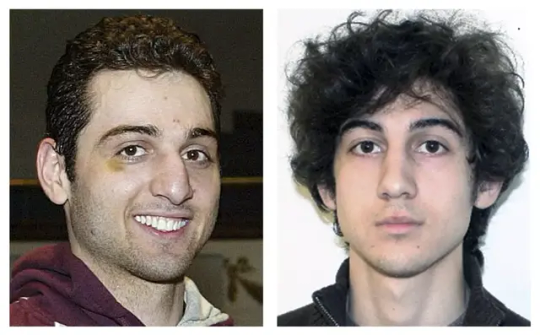

Jahar had a fascination with fireworks and explosives, while Tamerlan exhibited early signs of radicalization. Although there were no proper links of the two to terrorist groups, Jahar had revealed that the two obtained plans from Inspire, specifically its first issue revealing a step-by-step recipe on creating pressure cooker bombs or Improvised Explosive Devices (IEDs).
Inspire is an English online magazine published by al-Qaeda in the Arabian Peninsula (AQAP), infamously known as the group that perpetrated the 9/11 and PAL 434 attacks. The magazine is one of the many ways AQAP spreads its online agenda. Both international and domestic extremists have been motivated by radical interpretations of Islam and, in some cases, used its bomb-making instructions in their attempts to carry out attacks.
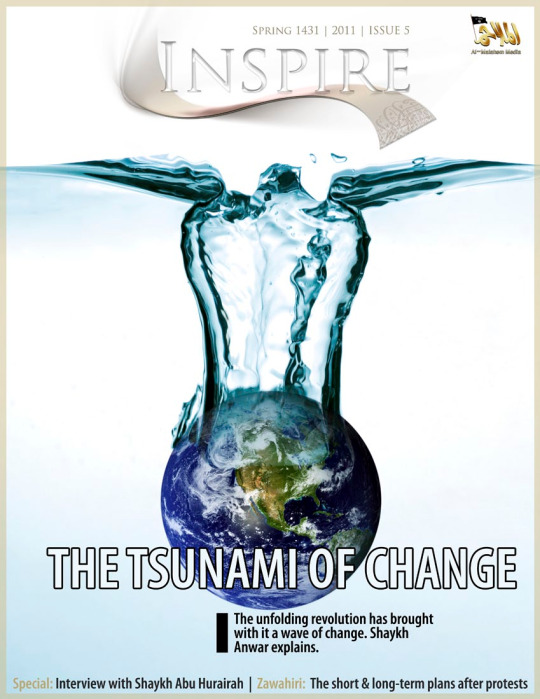
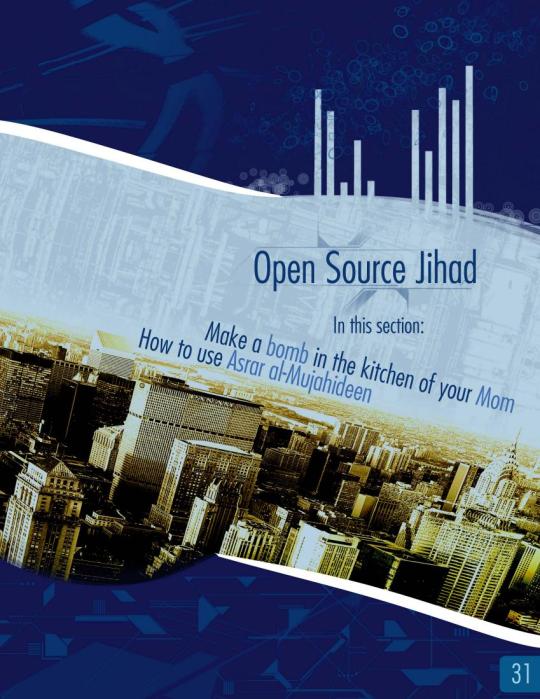

The insurgence of the 'Jihadi John Slideshow Trend'
During the period of 2014, youtube videos uploaded by the Islamic State of Iraq and Syria (ISIS) started surfacing on the internet. This was characterized by a series of masked militants criticizing the American or British government and then tying in the statements by the gruesome beheadings of hostages, ransoms, and soldiers.
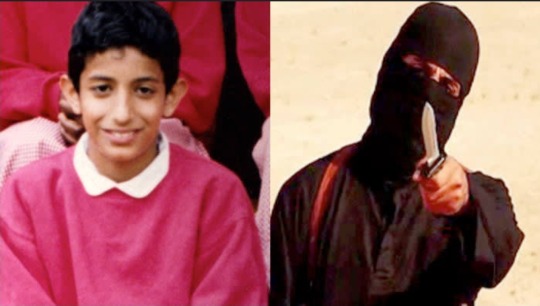
Terrorists had often used their media presence as a driving force to influence the youth into affiliating themselves with terrorist ties. One of these was Jihadi John, unveiled as British militant and Kuwaiti-born Mohamed Emwazi. In these videos, Emwazi is often seen looming over the camera holding a knife and standing next to a kneeled hostage. He ends every video by beheading his victims. One of his most famous videos was the beheading of American Journalist James Foley.
Around June 2010, Emwazi was detained and in the middle of 2020, the insurgence of the “Jihadi John Slideshow” trend had reached tiktok. While the origins of this trend still remains obscure, this has left a lasting impact on the youth. Often, the demographic consisted of teens, specifically young males, who romanticized and glorified the acts of violence portrayed by Emwazi and the aesthetic of militaristic weaponry. Many had credited this behavior to “edgy” standards and humor, however, this idealism was proven to be more unironic than it seemed. Eventually, in the proceeding years, the trend had died out, however, it had came back a few times during period intervals of 2022 to 2023.
This trend had also harmfully villainized harmless ideologies, distorting these ideas to the point where it is repulsing for the public’s perception. An example of this is the concept of Jihad, where it is essentially the Islamic philosophy of struggling to defend the religion and attaining peace within the community and outside of it. It promotes the unity and solidarity of individuals where militaristic action is only done as a last resort of intervention. Often, Jihadi groups such as al-Qaeda and ISIS have spread distorted and extremist versions of this ideology, creating a brand new concept of utilizing violent militaristic resistance to protect Islam. With this dangerous approach, muslim communities are stigmatized, discriminated against, and stereotyped. This is especially harmful because it is a large problem that affects the community in various ways, especially when terrorists rebrand concepts initially striving to attain peace as acts of hatred and war, tainting a beautiful religion with images of violence.
Conclusion
Circling back to Prof. Najem’s analysis, without the media’s attention and focus, terrorists are unable to achieve any of the following four objectives: (1) recognition of the group name or ideology, (2) ability to communicate with supporters, (3) communicate with members of the local government, (4) and depict itself as a legitimate political alternative to the current governments. To conclude this essay, the relationship between mass media and terrorism is a complex and interdependent one, where the intricacies of both entities should be carefully observed and analyzed to unravel the deeper connections between the two.
While some researchers argue that media coverage is essential for the success of terrorist attacks, this view is sometimes overly simplistic and does not fully capture the intricate relationship between media portrayal and public reaction. Additionally, not all terrorist groups prioritize publicity over their other objectives. The symbiotic relationship between the media and terrorism is further complicated by the role of the state, which must balance transparency with security.
Several case studies, including the Oklahoma City Bombing, the Boston Marathon Bombing, and the rise of figures like Jihadi John, highlight the ways in which media coverage can both shape and be shaped by terrorist actions. These examples demonstrate how terrorist groups leverage media to spread their message and recruit new members, while the media, in turn, benefits from the increased attention and revenue generated by such coverage.
Ultimately, this relationship underscores the powerful role that the media plays in both perpetuating and combating terrorism. The challenge lies in finding a balance between reporting news and preventing the unintentional promotion of extremist ideologies.
#understandnotcondone#oklahoma city 1995#timothy mcveigh#world trade center 2001#boston marathon 2013#jahar tsarnaev#tamerlan tsarnaev#jihadi john#mohamed emwazi#trrsm
36 notes
·
View notes
Text
when they finally pause their (lighthearted) wars long enough to talk about their feelings for each other, grian and doc realize that they work so well together-- yin and yang, opposites that slot together perfectly.
doc is mechanical (in more than the bodily modification sense). he operates in absolutes and principles. he thinks with utter rationality, and often finds himself so caught up in the logical that he loses touch with the more humane side of himself, the side that weighs more than just the individual action and takes the concepts of empathy into account. he allows himself to fall into the anger of slights against him, no matter how petty or inconsequential; it's the most logical reaction to actions taken against him.
grian is the utter opposite. he's so all over the place, caught up in the ideals of chaos and human reactions and the overly emotional. he struggles to bring it back down to earth and grasp the more logical side of things. it's part of why redstone is so incomprehensible to him, because he wants to connect what feels right, even if it isn't logical. he doesn't get angry, but rather allows himself to be lost in the absurd, allows himself to retaliate in ways silly and almost abstract in comparison to the jokes against him.
when doc gets caught up in the self as a machine, grian brings him up into the clouds, where emotions and human reactions rule, and reminds him that no living thing exist in the black and white, no living things exist with binary with inputs and perfect outputs. when his anger towards perceived slights overwhelms him, grian turns it lighthearted, pushes back against the desperately rational anger to instead help him find the absurd within the ire.
similarly, when grian gets taken with his own emotions or goes off the rails with some insane scheme (and the frustrations of said scheme), doc grounds him in the logical and known, reminds him of where the wires should connect and how the signals should flow, recalling the simple truths within the complex for him. when grian dives too deep into the lighthearted or absurd, past the point of knowing what should count as a slight against him, doc is rational on his behalf, reasonably angry for him when he should be, and stoic when grian's tumultuous emotions call for it.
they balance each other out. it works perfectly.
49 notes
·
View notes
Text
Risking | Tim Bradford | The Rookie
Part One | Part Two | Part Three | Part Four | Part Five | Part Six | Part Seven | Part Eight | Part Nine | Part Ten | Part Eleven | Part Twelve

One Year Ago.
March 16th.
Despite every fibre of her being screaming for her to run in the other direction, (Y/N) kept her pace steady as she approached Lamberts Coffee Shop. The place had been in operation for as long as she could remember, the owner, Reggie Lambert, was (Y/N)’s landlord at one point in time. She had always come here on weekends when the old man had been working behind the counter. If he still did, she would not have come. He was another life that she could not risk.
Pulling her hood over her head, she entered the cafe and placed an order for a plain black coffee. She would normally go for some complex, overly sugary coffee but talking was the last thing she wanted to do so the bitter taste would have to do. It came in a flimsy paper cup, resisting the urge to wrinkle her nose in disgust, (Y/N) made her way to the back of the cafe and sat down in the furthest corner.
This spot, unlike the rest of the store, did not attract many customers to sit. The lack of windows causes the area to seem unwelcoming and somewhat neglected. All of the sofas and the comfier chair were in the main section of the cafe, near the counter. If it were a normal day, she would have sat on the green sofa she had once owned. It got donated to Reggie when she moved in with Tim.
The sofa was old and worn down in all the best ways. The cushions seemed to consume anyone who sat on it. The tops of the cushions had lost some colour over the years and the cotton blend covers had gotten softer with use. Blankets were strewn over the back and there were some decorative pillows stacked up one one side.
Her favourite part was the small embroidery over top of the frontmost left foot. She had embroidered her and Tim’s initials into it just before she gave it away. The sofa had been her first purchase when she had started as a rookie Even though she had gotten it second hand herself, it had become one of her most valuable possessions. It hurt to give it away, even though she knew that she would be back in the cafe. It was like she was giving up a part of her life.
(Y/N) chuckled at the thought. Of course she thought it was one of the most tragic things, if only she could see herself now. Sitting in a cafe on the off chance she may see Tim again.
He didn’t know she was here, so he had no reason to come. They had always come together, the only time they had come alone was the day they had met. Reggie had mixed up their orders (he claimed it was accidentally but (Y/N) knew that he had been trying to get her to get back on the dating scene for a while). They sat down together and chatted. Tim left with her number. It was March 16th.
And they have spent every March 16th there since. Until now.
(Y/N) winced at the strong bitter taste of her coffee, slightly regretting not taking the extra seconds to get cream. She placed the cup back down on the table, she could bear the taste while she waited. It only took another couple of minutes, before the bell on top of the door chimed again. (Y/N) looked up at the noise and then back down at the sight of an elderly couple walking in.
It passed this way for a few hours. She would look up when the door chimed, only to look away when another stranger entered. She would take a sip of her now cold coffee and wait for another chime. By the time the clock read 4:30, she had been drinking for an empty cup for at least an hour.
Resigned to the fact that she would not see Tim today, (Y/N) binned her cup and moved in a hurry, cursing herself that she had thought that he would be there. Why would he have, he had no reason to go anymore. She was no longer in his life, she was no longer an anniversary worth remembering.
Adjusting her hood and keeping her head down, she opened the door to exit but waited for a man to enter. Swiftly, she left the premises, barely registering the all too familiar voice thanking her.
(Y/N) left the city after that. She knew the risk she had taken by coming here today, a part of her was thankful that she hadn’t seen Tim today because her selfishness hadn’t cost him anything. It took a few hours to arrive back at the dingy motel she had taken as residence.
The door was open when she arrived.
She had always gone out of her way to ensure that her accommodation was thoroughly locked and secure. There was no way that she had left it like that, it wasn’t in her nature. Nothing Has changed inside, her spare firearm was still tucked away in the bathroom cabinet, and her phone she used to call Williamson was still under the bed-side table. None of her clothes had moved from where she had strewn them across the floor.
The only difference was a polaroid on the bed.
The image was slightly blurry but it was clear what was being shown. Reggie slumped forward in a chair he was tied to. He was badly bruised, sporting a broken nose and a blackened eye. His lip was swollen up and cut from where had bitten down in pain. Blood was streaming from a wound on his head and from a single bullet wound in his chest.
As she examined the image even more, it became clear why such an atrocity had happened. At the bottom of the photograph in the white frame were two simple words.
Strike Two.
Silent, she picked up the photograph and moved to open the bedside drawer. Gently, she placed it down into the drawer on top of an nearly identical picture of her brother that read Strike One.
She knew what this meant. She had been sloppy. And she would pay the price. As she closed the door, she swore that she would not let her emotions allow her to make a decision that ended up taking a life of someone she loved.
Part Twelve | Part Fourteen
Series Masterlist | Masterlist
Tags: @xceafh @kmc1989 @buba424 @salty0cracker @iamasimpingh0e
Tags are open :)
#tim bradford x reader#time bradford imagine#tim bradford#the rookie#bottom of the river#chiefdirector
113 notes
·
View notes
Note
Kinda of random but what do you think of Alan's Moore comments about people liking comic book movies could lead into fascism? Seems like bitter old man territory but what do you think?
I think it's fair to say that fascism has been something of an obsession of Alan Moore's and a recurring although not omnipresent theme in many of his works.
While Miracleman is technically an expy of Captain Marvel, I would argue that the series is Moore's most extended commentary on Superman instead and especially the idea of the ubermensch. In Miracleman, our protagonist is initially thought to have been made into a superhero by a benevolent enlightened scientist, but eventually we learn that Miracleman is the product of an Operation Paperclip Nazi science project called the Zarathusa Project designed to create the literal Nietzschean Ubermensch, complete with a fixation on "blond gods" and a eugenicist breeding program. A superhero fight in the midle of London causes mass civilian casualties on the scale of an atomic bomb going off. Ultimately, Miracleman effectively overthrows Thatcher's government and rules as an enlightened despot before eventually leaving Earth for space.
Likewise, I think Watchmen is Moore's most extended commentary on masked vigilantism and thus on Batman. In Watchmen, the phenomenon of vigilantism is repeatedly associated with right-wing politics: Hooded Justice is a German circus strongman who has pro-Nazi politics; Captain Metropolis wanted his superhero teams to target "black unrest," "campus subversion," and "anti-war demos;" and the Comedian is a brutal nihilist who ultimately joins the U.S security state where he cheerfully follows orders to assassinate JFK and Woodward and Bernstein, commit atrocities in Vietnam, kill protesting hippies, etc. Finally, there's Rorschach, Moore's most famous mis-interpreted creation - Rorschach is a paranoid conspiracy theorist who's an anti-communist, anti-liberal, militant and militaristic nationalist, homophobe, misogynist, and avid follower of the John Birch Society-like New Frontiersman.
And then there's V for Vendetta, which I would argue is Moore's attempt to create a masked vigilante superhero with his own anarchist politics. In this story, the vigilante isn't a crimefighter but rather a revolutionary who seeks the overthrow of a fascist state and the creation of an anarchist utopia.
Moreover, his more recent comments about comic book movies being linked to fascism are arguably just part of his much longer-running commentary that superheroes as a concept are at the very least proto-fascist.
Having read a lot of Moore's work and interviews on the subject, I don't find his critique compelling. I think his definition of fascism is far too loose, I think his lens on the superhero genre is overly narrow, and I think his mode of analysis tends to neglect the vital area of historical context.
Definitions
So let's start with Moore's definition of fascism. I think Moore tends to really over-emphasize the whole idea of the Nietzschean ubermensch and the use of force to solve problems, and more recently he's been on this weird kick of saying that nostalgia and a childlike desire for easy solutions leads to fascism. I have several problems with this definition:
the first is that, as I've talked about in the past, fascism is a very complex historical phenomenon that can't be boiled down to a single idea, and in particular the idea of the ubermensch is a pretty small part of the German case (and even then how do you balance it against Nazism's more anti-individualistic aspects, like the mass party and the mass party organization).
the second is that the idea of a larger-than-life individual using physical prowess to solve problems is not unique to fascism. After all, during the 30s, you also had the Soviet Union promoting the heroic ideal of Stakhanovitism and the depiction of the heroic male factory worker in socialist realism. More importantly, the idea of a "larger-than-life individual using physical prowess to solve problems" is basically the same description for any number of literary figures from pulp cowboys to the Greek heroes of the Iliad and the Oddessy to the epic of Gilgamesh.
the third is that I think Moore's definition overlooks the actual drivers of the rise of contemporary fascism. Anti-semitism, racism, homophobia and transphobia, misogyny - all of these are real social and cultural forces that are actually motivating people to join the ranks of the alt-right, to commit massacres, to riot at the Capitol, and so forth. It is incredibly self-involved to think that superheroes and superhero movies are worth discussing in the same breath. At the end of the day, they're harmless entertainment compared to the real political issues that need to be tackled.
Moore's Model of Superheroes
Here's where I'm going to say something that's going to be a bit controversial - I don't think Alan Moore has read widely enough in the superhero genre to make an accurate assessment of its relationship to fascism. If we look at his comics work, and we look at his writings, and we look at his interviews, Moore's mental model of the superhero really only includes two figures, Superman as the representative of the superpowered ubermensch and Batman as the representative of the masked vigilante crimefighter. Notably, Moore hasn't really touched the last of the Big Three - Wonder Woman, a superhero with a strong legacy of radical left-wing politics. I do think we have to mention, given Moore's somewhat troubled history when it comes to issues of gender, that Moore's model of the superhero doesn't include any female superheroes (or for that matter, any superheroes of color or queer superheroes). (EDIT: I should clarify - Promethea is Moore's version of Wonder Woman, but she doesn't really come up in his discussions of fascism, and her thematic profile has more to do with Moore's interests in magic.)
And other than Captain Britain, Moore never worked with any Marvel character and basically ignores them.
To me, this is like having a career as a painter and never working with colors. Moore's model of the superhero leaves out the Fantastic Four and how their flawed psychologies revolutionized the industry and the whole idea of the superhero-as-explorer, it leaves out Spider-Man and the idea of the superhero-as-everyman whose central struggle is about work-life balance and altruism, and most importantly it leaves out the X-Men and the idea of the mutant metaphor.
If as a critic you're going to make grand pronouncements about something as morally evil as fascism, I think it really is incumbent on you to have read and analyzed widely rather than cherry-picking a couple of case studies. Especially if you have something of a tendency to mis-characterize those case studies by ignoring historical context.
Historical Context
So let's talk about Superman and Batman and their emergence in the 1930s. One vital bit of context is that the U.S experienced a significant crime wave in the 1920s and 1930s as Prohibition encouraged the rise of organized crime and then the Great Depression spurred the rise of kidnapping and bank robbery gangs. Moreover, municipal police forces tended to be wildly corrupt, accepting bribes from organized crime to let them operate with impunity, while not letting up in the slightest in their brutal oppression of workers and minorities.
In this context, I think the idea of vigilantism - while it has an undeniably racist legacy dating back to Reconstruction - is not purely a conservative phenomena. It's also an expression of a desire for help from somebody, anybody when the powers that be are of no help. And at the end of the day, unsanctioned use of force can equally be traced back to left-wing self-defense efforts from the Panthers back to the Communist Party's streetfighting corps to unions packing two-by-fours on the picket line - so I don't think we can simply equate punching a bad guy with racist lynch mobs and call it a day.
So let's talk about Superman and the ubermensch. I think Moore has a bad tendency to focus on his nightmare scenrio of a godlike being tyrannizing and destroying hapless humanity, while minimizing the actual ideas of Siegel and Shuster. He tends to take their use of the Nietzschean as a straighforward invocation instead of the clear subversion it was intended to be - rather than a blond god who imposed tyrannical rule with horrific violence, Siegel and Schuster made their Superman a dark-haired Moses allegory, who rather than solely fighting crime acted to stop wife-beaters, war profiteers, and save the life of death row inmates, and whose secret identity was of a crusading journalist who uncovered corrupt politicians.
To be fair, Alan Moore admits that Superman started out as "very much a New Deal American” - but because this kind of does near-fatal damage to his argument, he quickly minimizes that by saying that Superman got co-opted and thus it doesn't count. This is some No True Scotsman bullshit - Moore knows that his example just imploded so he tries to wriggle out of it by arguing that Superman sold out to the Man. If we go back to the actual historical evidence, we can see that at the outset of the Red Scare, the Superman radio show went on a crusade against the Klan, and throughout the conservative 1950s, Superman was used to propagandize liberal values of religious and racial equality:

So much for selling out.
On the other hand, Batman is a tougher case, given that his whole deal is being a masked vigilante who wages an unending war on crime to avenge his murdered parents. So is Batman an inherently fascist figure, a wealthy sadist who spends his time brutally beating the poor and the mentally ill when he could be using his riches to tackle social issues? I would argue that this version of Batman is actually pretty recent - very much a legacy of the work of Frank Miller and then the post-9/11 writings of Christopher Nolan, Johnathan Nolan, and David Goyer - and that there have been many different Batmen with very different thematic foci.
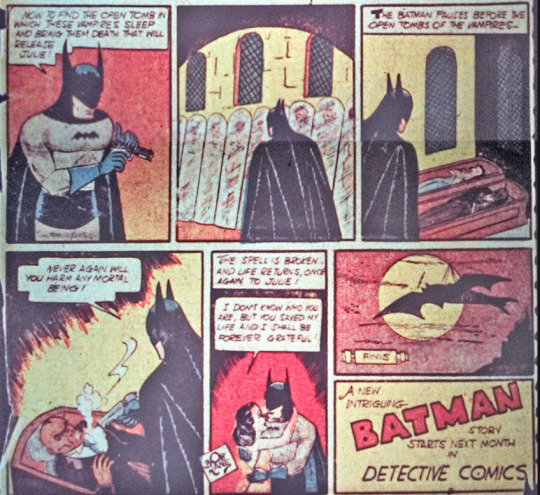
For example, the early Batman was as much a figure of horror as he was of superheroics - he fought Frankensteins and Draculas, he killed with silver bullets, etc. Then in the 40s and 50s, you got the much more cartoony and light-hearted Batman who pretty much exclusively fought equally oddball supervillains in such a heightened world of riddles and giant pennies and mechanical T-Rexes that I don't think you can particularly describe it as "crime-fighting." Then in the 1960s, you have the titanic influence of the Batman TV show, where Adam West as Batman was officially licensed by the Gotham P.D (so much for vigilantism) and extolled the virtues of constitutional due process and the Equal Pay Act in PSAs and episodes alike. You can call the 1966 Batman a lot of things, but fascist isn't one of them.
Conclusion
I want to emphasize at the end of the day that I'm a huge Alan Moore fan; I've read most of his vast bibliography, I find him a fascinating if very odd thinker and critic, I've even tried to read his mammoth novel Jerusalem (which is not easy reading, let me tell you). At the same time, it's important not to treat creators, even the very titans of the medium, as incapable of error. And in this case, I think Alan Moore is simply wrong about fascism and superheroes and people should really stop asking him about it, because I don't think he has anything new to say about it.
159 notes
·
View notes
Note
I've read through the End Racism posts (not all, but a good part of them) and think the people behind it do have good and honest intentions, and that a lot of things are being blown out of proportion. I don't necessarily agree with some of the ideas regarding out of archive harassment and AO3's responsibility, but I can see the thought process. Same with a lot of other things. I'm very wary of Stitch being cited, but can likewise understand why people may not fully clue into why there are.... so so so many issues with that. If you haven't been hyper involved in fandom (included those you're not in) you miss things. Which is a whole other issue lmao. But overall, I don't think anyone is being malicious
That being said, there's a lot that seems.... overly optimistic? Or perhaps very central to where the creators behind End Racism are from and their own biases and education. People have brought up HOW on earth what is or is not racist (beyond the incredibly obvious examples) can be decided, or how you can know who's writing a fic and why (is it a racist bigot, someone writing about their own experience as a POC, or someone who doesn't know something?) and the answer, as another anon mentioned, is never really stated. Because there isn't an answer in many cases, but that hasn't been acknowledged
I also worry about the insistence (in some responses to questions and in notes I've seen even in the asks you've received) that a diversity consultant will help as much as people seem to think. Yes, it's a step forwards.... but a diversity consultant cannot be an expert in EVERYTHING. I suppose the argument is "get more diversity consultants to volunteer" but that still causes it's own issues. I was in a server with someone who frequently read over fics as a sensitivity reader, and was extremely well educated and respectful. But even they flat out said they made a hell of a lot of mistakes once they stepped out of what they knew, and wouldn't give feedback on certain things. I worry a diversity consultant would be, well, very american centric, and while that isn't necessarily a bad thing, people have brought up how it could be, and those concerns are being completely brushed to the side.
I think there's just SO much to this, and so much more complexity than they're willing to admit. Again, other anons have brought this up, but there's a ton nuance in this. We're talking international views on majorly complex issues, with endless cultural lenses, people writing and reading from countless backgrounds, and so on. It really just feels like they don't want to even acknowledge that
I don't think most behind it are trying to actively push for censorship, or are operating in bad faith. That's my impression from reading on my own. There have been some individuals around tumblr that have been horrific about it (the anti-semitism that came out is.... something), but overall I think there are good intentions. But so many pertinent questions aren't being answered, and the very valid concerns people have brought up have been ignored.
I support the idea behind it, and having a diversity consultant on staff certainly isn't a bad idea, but the way in which they're going about things, the concerns they're ignoring, and the dismissal of people who are raising said concerns as racists is. huh. Well, it makes me wary to actively support.
--
81 notes
·
View notes
Text
something i think is funny whenever i come across it on the internet is when people assume that there is like, a book akin to the bible with the full set story of greek mythology. i think since christianity is so widespread there is an assuming that other religions operate the same way just with a different god, even if said religion is polytheistic and not monotheistic.
once someone on youtube in a comment section, the shuddering inducing comment section of a video which claimed athena to be the “goddess of love” and then an influx of people who said that “it was aphrodite” and more people saying “shes the goddess of beauty”,
i was told to my greek mythology special interested self, my hellenistic pagan face (not that i think i know more than everyone, but definitely more than the people who insist miss lady aphrodite is NOT a goddess of love?) that aphrodite WAS the goddess of love, but when her son eros was born, she gave that title over to him instead…i do enjoy a few laughs in my daylit periods of ongoing enforced stress i must admit
they also insisted that ares was the only war god, not athena. and would not take the fact that eros is a very complex god when it comes to origins. although they have left the interaction (thank apollon) i still think it is so interesting the idea that each god is part of a set storyline with one job only, and that there are no crossovers of domains (especially with domains as fickle as love and war), and it makes me so giggly when the first result on google has more accuracy than a hand crafted by the world human mind.
we seem to forget that greek mythology was passed down through oral tradition and story telling, occasionally written down or drawn on walls or bowels or other forms of pottery, or made into statues. these gods were at constant evolution and still are, because greek gods are the peoples, unlike the christian lord, the greek pantheon is under the influence and impression of the society it lives within, not the inverse.
there are gods with mixed parentages (aphrodite, hephaestus, eros, dionysus), gods with many many titles (apollo, artemis, perhaps poseidon) and gods whose characters are very fickle throughout myths because it was a large region of people all retelling the stories to one another and mixing with other large regions of people and their stories and sometimes scribing that into some lasting piece of art
overly sarcastic productions on youtube have very accurately described each piece of art as a snapshot of the gods in their ever changing states, you can also go look at jake doubleyoo on youtube and at the videos not of comedic edutainment of the various mythologies and instead some insightful commentary on the greek mythological origins of all the surviving mythology we have
just something ive been thinking about :)
16 notes
·
View notes
Note
Young Sephiroth is such a depressed child. I thought maybe his mannerisms were just…like that, but the more I watch his chapter and compare with the other kids in the story, the more I realize how sad he comes off. The writers did an amazing job of depicting what a kid raised in a cold sterile lab and trained to be a military operative would be like. He is still emotional but he isn’t expressing it like others.
It creates this illusion that he is alien or otherworldly, but it’s just how a person raised like him would realistically act.
I feel so bad for him…he needs his mom…
He touches his chest a lot, where I assume he carries his photo in a pocket. He does it like four different times so far. It gives off the impression that he's basically using it as a kind of security blanket whenever he's feeling unhappy or anxious.
It's funny. Before this, my headcanons on Sephiroth's mommy issues were based primarily on broad assumptions based on his behavior and dialogue during Nibelheim. But now it's...real. Like completely real. Like lots of people (including myself) theorized, this really IS a huge thing for him that completely defines his life. It's very sobering and also rewarding to see come to life. Sephiroth's mother complex was basically tailing him since his earliest years and he never really lets go of that insecurity. His separation from Lucrecia, more than anything else, shapes him into what he eventually becomes, all at Shinra's hands.
But yeah, EC Sephiroth is interesting. He's clearly brainwashed, giving orders and spouting a bunch of propaganda. But he's also self-aware enough to KNOW that all of this is bullshit, and that he doesn't enjoy what he does. He's awkward and overly polite. He can be grouchy and former in some spots, but shy and sweet the next. He feels very well-rounded and I can't wait to see more of him!
#asks#ff7#ffvii#final fantasy 7#sephcanons#sephiroth#young sephiroth#ffvii first soldier#first soldier#ever crisis#ffvii ever crisis#ff7ec#ff7 ever crisis
41 notes
·
View notes
Text
## sim jake x reader, KISS CAM— GONE WRONG?!
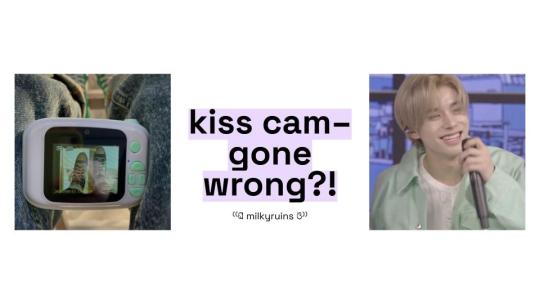
summary: you work the kiss cams and everything goes smoothly. but one day, the cam gets turned towards you.
genre: fluff
content warnings: mentions of dubcon situations (the concept of the kiss cam), reader is almost physical injured by a basketball, slight peer pressure.
wc: ~.7k
yes, perhaps the concept was outdated. perhaps it created discomfort and dubiously consensual situations for its victims. perhaps it was even, as the aged alumns squawked every game, profane.
but your uni never banished the infamous kiss cam and you were being paid to operate it. and honestly, your wallet couldn’t afford the contemplation of ethics.
it was a pretty easy job– you showed up to the stadium, enjoyed the game like everyone else, and just swiveled around your camera a little during breaks. and it was nice because you always got extra plus one seating, meaning that your sports buff of a boyfriend, jake, could always keep you company with overly complex game analysis and an arm slung over your shoulder.
and it was just about time for half-time. begrudgingly, you left the warm embrace of your boyfriend and made your way to the camera. in a flash, your headset was on, you were scanning the crowds for lovebirds, and the jumbotron was whirring to life. you only had a few more seconds to settle on a duo to project onto the jumbotron, but all the adrenaline you felt as a newbie never arose nowadays. even if the “couple” you landed on wasn’t really a couple, it was the awkward scenarios that also made the kiss cams entertaining.
well, you said that, but the moment you spotted a basketball flying at you in your viewfinder, a decent amount of adrenaline shot through your body. as much as your brain screamed at the rest of your body to move, your legs stiffened, planting you firmly into the ground you stood on. all you could hear was the sound of your own heartbeat ringing in your ear. helplessly, you squeezed shut your eyes.
but the impact you were waiting for never came. as your opened your eyes, you realized that jake’s arms were wrapped around your waist and that you were back on the bleachers.
“babe? are you alright?” jake whispered through his panting. you nodded. you swiveled around and locked eyes with your boyfriend.
“i’d be a goner without you.”
you both laughed. “you’re far too dramatic for your own good.” he replied.
the confusion that settled across the bleacher soon turned into hooting. it sounded like a typical response to the kiss cam… the kiss cam that you weren’t operating.
“shit! i need to work th-”
as you wriggled out of jake’s grasp, you realized the camera was on. and that the lens was pointed at you.
in a mild panic, you readjusted your headset. you needed your manager ASAP.
you heard your manager in a frenzy. “y/n, y/n, do you copy? y/-”
“i’m here.”
a sigh sounded on the other end of the radio. “i’m assuming you’re absolutely confused?”
“that’s about right. how do i fix-”
“y/n, listen to me. the stray basketball ended up hitting the camera and swiveled it toward you and jake. they saw you two being intimate and now want you guys to kiss.”
“fuck.”
the crowd was now cheering louder, and you were pretty sure jake realized what was happening.
“as much as i understand how you’re feeling, please refrain from using that sort of language on the shared-”
jake gently took your headset off for you and placed it on the seat behind him. “you realized?”
he nodded. “it’s kind of obvious when the camera’s pointed directly at us. and the crowd’s cheering ‘camera person’ over and over again.”
you scrunched your nose. “‘camera person’? is that the best they can do?”
jake slipped his arm around your waist, eliciting another wave of cheers from the fans. he pressed his forehead against your own and carded his fingers through your hair. it was just you and him in this moment. “do you want to just get this over with?”
“do you?”
you both nodded at the same time, creating some uncomfortable forehead chafing. but it sent you guys into a fit of giggles, which created a wave of “aws” from the onlookers.
and now it was finally time to get serious.
jake’s hand softly cupped your cheek. you two exchanged a secret smile and then leaned in.
#jake imagines#jake x reader#enypen imagine#enhypen x reader#jake oneshot#enhypen oneshot#jaeyun imagines#sim jake imagines#sim jaeyun imagines#jake fluff#i must have a thing when it comes to writing abt sports#especially with potential head injury via a mysterious flying ball#@my seungkwan soccer au! fic#i hope jakey nation appreciates this blue jay's contribution#! 💬. ⋆。𖦹 °✩ minis
224 notes
·
View notes
Text

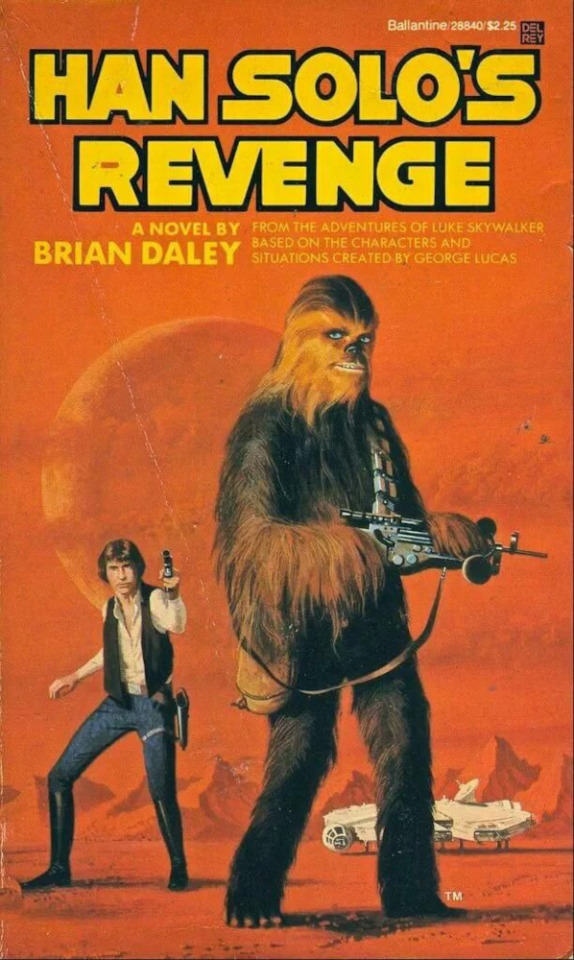
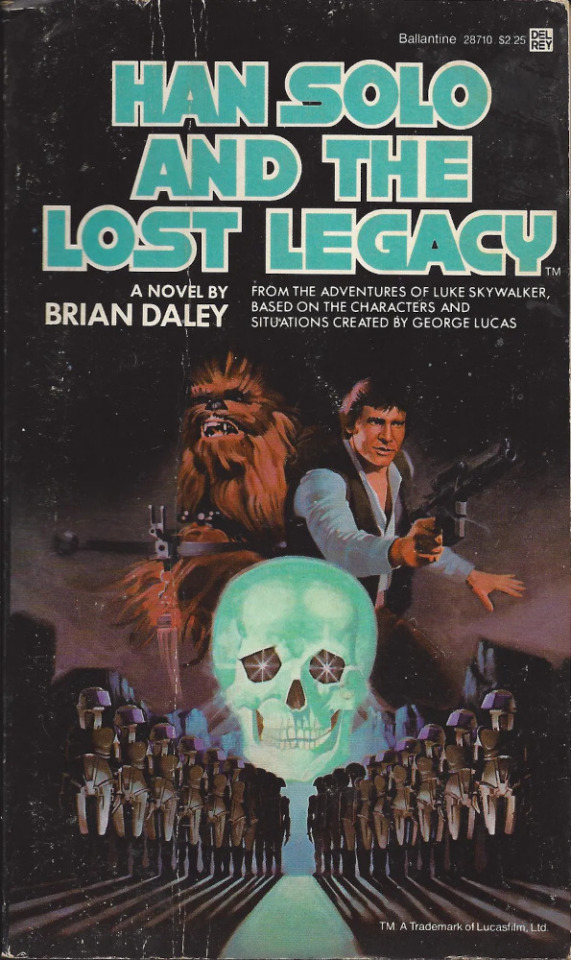
April 1979, October 1979, and August 1980. These novels by Brian Daley were not the first STAR WARS tie-ins, but they were the best of the early phase, and a strong influence on later SW media. The creative success of these exciting, frequently very funny books, which chronicle three adventures of Han Solo and Chewbacca prior to the first movie, had a lot to do with Daley himself. According to Daley's friends and his partner, novelist Lucia St. Clair Robson, Daley was Han Solo, or close to it: a brash military veteran with no love of authority, a fondness for sports cars and motorcycles, and a notoriously sarcastic sense of humor that concealed a heart of gold. Ironically, Daley, who genuinely loved STAR WARS, would have preferred to explore the history of the Jedi, but Lucas declared that off-limits, and imposed many restrictions on what Daley could and couldn't use from the films. For that reason, the novels take place on the fringes of the Empire: The first two books are set in the Corporate Sector, a region administered semi-autonomously by corporate interests with their own ruthless Security Police (an idea that clearly inspired some of the plot of ANDOR), while the third is set in the Tion Hegemony, a remote principality.
HAN SOLO AT STARS' END has Han and Chewie roped into aiding a group of people whose relatives have been "disappeared" by the Corporate Sector Authority, which is quietly rounding up dissidents and sending them to a secret facility called Stars' End. After Chewbacca is captured by the Security Police, Han concocts an elaborate, harebrained scheme to rescue his friend and the other "lost ones" from the galaxy's most closely guarded high-tech prison. Naturally, things don't go quite as planned, leading to a spectacularly ludicrous finale. (Spoiler: Han accidentally launches the prison complex into space.) This novel was subsequent adapted for the STAR WARS newspaper strip by Archie Goodwin and Alfredo Alcala, although the adaptation unfortunately isn't a patch on the original.
HAN SOLO'S REVENGE finds Han and Chewbacca, desperate for cash, taking a job that turns out to involve transporting slaves. This is a line our heroes will not cross, so after dealing harshly with the slavers, Han agrees to help a Corporate Sector Authority auditor named Fiolla of Lorrd track down the ringleaders of the operation, one of whom is her once-trusted assistant, Magg. Meanwhile, Chewbacca is forced to contend with a stubborn skip-tracer called Spray, who is determined to repossess the Millennium Falcon over Han and Chewie's unpaid bills!
HAN SOLO AND THE LOST LEGACY has Han and Chewbacca agreeing to help Han's old buddy Badure, Badure's friend Hasti, and an academic named Skynx locate a legendary lost starship, the Queen of Ranroon, the fabled treasure ship of an ancient tyrant called Xim the Despot. (The skull on the cover is Xim's emblem.) Although this sounds like it was influenced by RAIDERS OF THE LOST ARK, the book was actually published almost a year before the premiere of RAIDERS.
Although the novels make clear that Han is not overly fond of droids, the books give Han and Chewbacca a pair of droid companions: a laconic old labor droid called Bollux, and a small, extremely sophisticated, disconcertingly enthusiastic computer probe called Blue Max, who "lives" within a compartment in Bollux's chest. Here's how Alfredo Alcala depicted them in the comic strip:

Daley also includes some delightful aliens, including the skip-tracer Spray, who's a Tynnan — basically a sentient beaver with the dexterity of a raccoon — and the Ruurian academic Skynx, a sentient caterpillar who's determined to complete as much of his research as he can before entering the next phase of his life cycle and becoming a chroma-wing who'll have little memory of his former identity.
A useful companion for the first two books is Michael Allen Horne's HAN SOLO AND THE CORPORATE SECTOR SOURCEBOOK for the West End STAR WARS RPG, published in 1993:

Aside from the inevitable game statistics and some quite decent illustrations of the novels' characters, the sourcebook fleshes out Daley's conception of the Corporate Sector Authority, explaining how the Corporate Sector functions and its relationship to the Empire. This is narrated in part by Han Solo himself, which is presented as excerpts of later interviews with an Alliance historian named Voren Na'al (a common conceit in the WEG game books that works especially well here). The sourcebook is best read after the novels, since it explains their plots in detail, but it's a worthwhile supplement. Unfortunately, a planned followup describing the Tion Hegemony was never published before West End Games lost the SW license.
Brian Daley's other major contribution to STAR WARS lore was scripting the NPR radio adaptations of the first three movies. STAR WARS originally aired in the spring of 1981, THE EMPIRE STRIKES BACK two years later. Daley also wrote the later adaptation of RETURN OF THE JEDI, but he died of cancer in early 1996, at the age of 49, so the final drafts were completed by John Whitman.
#books#star wars expanded universe#han solo adventures#brian daley#wayne douglas barlowe#dean ellis#william schmidt#han solo#chewbacca#corporate sector authority#archie goodwin#alfredo alcala#star wars andor#star wars
20 notes
·
View notes
Text
Scott Peterson: 🥀
Venus Love Style Reading
Scott Peterson, whose name became infamously linked to a tragic crime, was convicted in 2004 for the murder of his wife, Laci Peterson, and their unborn son, Conner. The case gripped the nation, unfolding a story that, on the surface, seemed to be that of an all-American family. Yet, as details emerged, the facade of a loving husband and father-to-be crumbled, revealing a much more sinister reality. Laci Peterson disappeared on Christmas Eve of 2002, sparking a massive search operation. Scott's initial portrayal as a grieving husband began to falter under scrutiny, especially when it was revealed he had been having an affair with another woman, Amber Frey, who was unaware of his marital status. This revelation casts a shadow of deceit and infidelity over Peterson's character, undermining his initial claims of innocence.

The investigation uncovered a web of lies and suspicious behavior, from Scott's purchase of a boat shortly before Laci's disappearance to his actions and movements on the day she went missing. The discovery of Laci and Conner's bodies near the area where Scott had been fishing on the day of Laci's disappearance further implicated him, despite his vehement denials of any wrongdoing. Scott Peterson's trial was a media sensation, drawing attention not only to the details of the case but also to broader issues of marital betrayal, the portrayal of victims and perpetrators in the media, and the death penalty in the United States. Convicted of first-degree murder for Laci's death and second-degree murder for the death of their unborn son, Peterson was sentenced to death, later commuted to life imprisonment without the possibility of parole after California declared a moratorium on the death penalty.
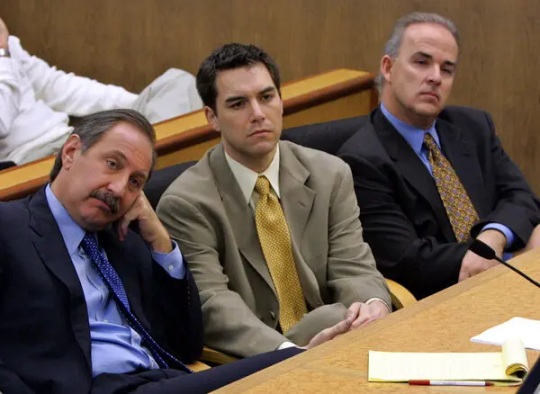
Scott has Venus in Virgo, meaning Venus is in FALL. The concept of a planet being "in fall" is not about doom and gloom but rather about the complexity and depth it brings to the planet's expression. For Venus in Virgo, this positioning emphasizes a more analytical and critical approach to love and relationships. The warmth and spontaneity of Venus are replaced with a desire for perfection, often leading to a critical or overly analytical attitude towards partners and a tendency to focus on flaws or what can be improved rather than unconditional acceptance and affection. Already a placement fraught with critical and perfection-seeking tendencies, it gains a more sinister hue when we consider the destructive degree at 22. This isn't just about striving for an unattainable ideal in love or being overly critical of a partner; it's a harbinger of a love twisted, where the pursuit of perfection becomes a destructive force, not just emotionally, but in the most tragic and final sense.
Scott also has Venus in the 10th House, which when negatively aspected indicates an individual who uses relationships as a means to an end—where partners are chosen or valued based on how they contribute to one's image or goals. The desire for an ideal image to the public might overshadow the genuine emotional connection in the relationship. This could manifest as presenting a facade of a perfect relationship or family life to the world, even if the reality is far from perfect.
The sextile between Venus and Mercury in the secretive 12th House, rather than merely suggesting a preference for intellectual connection and private conversations, now casts a shadow of duplicity. It's as if Scott's capacity for intimate communication was a double-edged sword, capable of deception as easily as a connection. This aspect, under this grim light, speaks to a mind that could rationalize the irrational, and justify the unjustifiable, where the whispered words behind closed doors were not of love, but of lies. The square between Venus and Saturn in the 7th House, the domain of committed partnerships, becomes even more ominous. Instead of simply implying a strained or duty-bound approach to relationships, this aspect now screams of a suffocating control, a need to dominate and dictate the terms of love until it chokes the life out of it—literally. Saturn's cold, restrictive influence here speaks not to the normal challenges of marriage but to a relationship under siege, where one partner becomes a warden, and the other a prisoner.
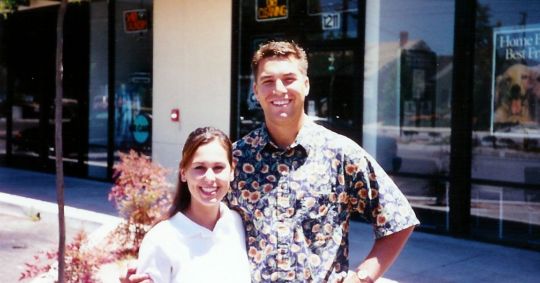
The trine to the North Node in the 2nd House, which might in other contexts suggest a journey towards valuing oneself and one's possessions now has a macabre twist. This aspect, in the story of a man who killed his wife, hints at the ultimate material possession: taking a life into one's own hands, and claiming ownership over another's existence. It's a stark and harrowing reminder that in some twisted minds, love and possession can become fatally conflated. The stark parallels between Scott Peterson's astrological chart and the heinous crime he committed serve as a chilling reminder of how the darker facets of our personalities can be reflected in the stars. While astrology often offers insights into our strengths, desires, and potentials, in Scott's case, it also mirrors the depths of deceit, manipulation, and control that led to an unfathomable tragedy.
xox astro ash ✨ Get your own "Venus Love Style Reading" @ astroash.net ✨🥀
#astrology#astrology readings#astrology aspects#natal chart#astrologer#pop culture#celebrity#astrology degrees#astro observations#astro community#venus#love#lovers#virgo#virgo venus#22 degrees#kill or be killed#scott peterson#10th house
10 notes
·
View notes
Text
Okay time for an
Introduction to magic on Elbeth (part 1)
When I first started this blog the magic was completely undefined as the setting as a whole was just meant to facilitate rp interactions. In time, however, I've become attached to this world. This is my attempt at drafting basics of magic. Note that a fair bit of these ties back to the previous lore on how spirits function. Also note that this is intentionally overly complex to facilitate being able to make very different characters. Finally note that while I prefer in character lore posts magic is something of a lot of scholary debate in universe so they couldn't explain it effectively.
Alrighty let's start off with
The sources of Magic
Magic has been studied for over a millenia around the world of Elbeth. Given the dangers of the wilderness and seas, word did not often travel fast or far. This rings true even as some factions begin to operate across the entire world. For that reason a multitude of differing magical approaches and theories have developed. Often there are clashes between assertions developed an ocean apart, made by basing theory on the limitations of their style. Some go as far as to state that there are multiple different magics rather than a single encompassing system. Other agree magic is unified in source and rule. In particular, many schools debate if religious magic and traditional magic are one and the same.
What few scholars will question is the fact that anyone can wield magic. Well, theoretically. There are people born with an intrinsic ability to sense or feel magical energy around them, this is known as being touched. Those who are not touched must first go through the process of honing their spiritual senses. Something quite difficult even with a skilled teacher. Even among the touched the level of sensitivity to such energies can vary with many still needing a tutor. Secondly, most of the feudal kingdoms and empires of Elbeth work to keep magic firmly in the hand of the nobility. In large swathes of the world it is illegal for mages to take commoner apprentices or for academies to open their doors to them. These two factors serve as a bottleneck to developing magical ability. Somewhere around 10% of the world's population can perform some magical abilities but less than 1% of the population can perform powerful feats of magic.
It is, of course, possible to learn magic on one's own but being self-taught is quite challenging. To understand why lets go into the powers behind magic. The core: Spiritual Energies, Leylines, and Inner Alchemy. As well as the auxiliary: Words of power, Materialism, Symbology, Places of Power, gesticulation, and instruments. It's a lot (part of the reason mages are so few) but some is much more important than others.
Spiritual Energy
In case you do not recall the lore on it, lets do a quick refresher. A spiritual land overlaps with that of reality, filled with spiritual denizens. Just about everything within the world produces some form of energy in the spiritual world. A burning torch produces flame energy, vast amounts of water energy is made by the oceans, strong feelings such as anger and joy create energy, there is energy of innovation, nature, beauty, progress, and varying arrays of energy embodying concepts. Granted some energies are much rarer than others. Spirits feed off of these energies and as they taken in more and more energy it effects the form of spirit they evolve into.
With that summary done, how do these energies effect mortals? Well, mortals have the ability to shape and manipulate this energy as well as to absorb spiritual energy from their surroundings into themselves. This is the core basis for the casting of magical spells. If one wishes to cast a spell to create a bolt of flames or make it rain then a quick application of fire or water energy is the simple solution.
It is simple but simple does not mean safe. Absorbing spiritual energy into their bodies create several risks for mages. For one it makes them a tasty snack for spirits. Spirits struggle to drain energy from the living but it practically spills out of mages as life fades. In tandem with this, whenever a mage vents this energy to cast spells it draws spirits right to them, magical duels basically create a lingering spirit buffet. A secondary accompanying issue is the effect of letting this energy into their bodies. As it turns out, filling up on magical energy can have varying effects on the body. Lets take the blog mage Necromancer as an example!
Necromancer makes heavy use of Cthonic energies for the casting of her spells. Most notably the energies of death and decay. Having these energies flowing through her body is what causes her to be so pale, physically weak, and easily tired. Over the long term this can have severe effects on a mage. Even should she vent all of her energy, it would likely take years for Necromancer to recover due to having such energies flowing within her body for so long. On the other hand, a pyromancer's body is hot to the touch, far worse than a person should be. In any case, one should be careful not to overload on their energy of choice.
All living creatures have natural life energies (this'll be touched upon more under inner alchemy) but even if this energy is spiritual there's only so much room for it in a person. Mages that pool large amounts of energy in their body often do it at the cost of some of their life force. A fact that weakens the body. There are two responses to this limitation. Some mages take excellent care of their body, regular exercise, eating healthy, and self-care to give themselves a higher pool of life force to work with. Others do not bother and instead accept that they're trading physical health for great power.
Alright we're almost done with the dangers but next one requires a bit more explaining of the process. The majority of the process of casting a spell happens eternally. One manipulates the energy flowing through their body as they prepare a spell. As a result of this, should something go wrong with spellcasting, the effect normally occurs within the body of the caster. This is, as a general rule, not good. As a light example, a hydromancer that miscasts may find themselves vomiting up a ton of water as the water energies run wild in their body.
Continuing with an explanation of the process. It is generally much easier to manipulate energies and perform magic when you understand how the things you're doing function. It's easier to manipulate the wind around you if you grasp how air flows or to create a fire blast if you understand combustion. Thus become a mage often involves the studying of the natural sciences and mathematics. Others choose to learn the basic rules of how things works by practicing spells of certain styles repeatedly. Whatever the method it is considered important to understand the magic you're working with. For that reason the majority of mages specialize. It just ain't possible to know everything about everything. Most mages instead become experienced in a few similar energies which leads into the development of pyromancers, time wizards, gap witches, and so on. This is not just a matter of better understanding what they're doing, it also allows the caster to become more accustomed to the energies they work with and build up a tolerance to their effects.
One can store multiple energies within their body in varying amounts. As it flows through the mage's body, the energy can even be used to manipulate one another. Such as fire and water energy being processed to produce steam energy (rather than drawing it from a natural source of steam). Of course this is an advanced process that can throw off the energies of the body when done without experience. Generally it requires a good understanding of natural sciences.
One point of importance among mages is the concept of prime elements. These are energies that serve as fundamental building blocks of reality and are considered core energies of magic. They are said to be core because they are abundantly available, easy to manipulate, and particularly potent. Different schools, however, identify different elements and their energies as being the prime elements. Elements are highly tied to alchemy and thus the two predominant approaches come from centers of alchemy. The Espardan Style states that the prime elements are: Fire, Water, Wind, Earth. The Gale Approach instead lists Fire, Water, Earth, Metal, Wood. While these are the two largest schools of thought, with widespread practices, smaller schools and regional styles identify many other concepts of prime elments, such as void, space/aether, steam, ice, sound, electricity, bone, life, smoke, light, mind, decay. It's safe to say there are many theoretical elements to choose from. Many mages predominantly work with elemental based magic and are known as geomancers, elementalists, or druids.
It is important to note that much less energy is needed to manipulate the environment than it is generate from the energy. As an example, it takes far less fire energy to form the fire from a nearby brazier into a ball and fling it than it would to create a fire ball on one's own. In addition it is much easier to draw energy from regularly refilling sources than to seek it out on one's own. Thus many mages either specialize in a style that fits the environment of their home or flock to places that support it. That is you'll often find pyromancers around volcanos and water witches by the sea.
Mages are set to have a pool. This is how much energy they can store within themselves before it starts having a negative effect. How much their pool holds is referred to as depth and depth varies from mage to mage. Training can increase someone's depth but there is a wide variance in the depth people are born with. Other factors that have an influence over a mage's casting ability is the rate at which they can absorb energy from the environment around them and the amount that they can release at once in their spell slinging.
The use of magical energies is where the debates on if faith-based spells are magic are most notable. Most magical priests/champions do not drain spiritual energy as typical mages do (though they can learn to do so). Instead the energy seems to be provided to them by their gods. This limits their abilities to that which falls within the purview of their God but also means no need to gather energy or suffer the effects of storing it. Granted casting too many spells still proves an issue as all the energy places strain on the body, so they do not gain limitless casting through their faith.
The magical energy most unique and of the greatest note is Creation. Creation is said to be an emulation of the energy used to create the universe and the world. It is by far the most potent of magical energies and can be used to create things outright (be they temporary of permanent) or used in conjunction with another energy to create far more powerful spells. It is far more versatile than any other energy. It is, however, incredibly difficult to harness or manipulate taking a heavy amount of skill to utilize. Not only this but, while most energies can be stored long term, creation quickly starts to fade. It is not easily harnesses from environmental sources either. The primary source of creation is through the creation/performance of art. Any mage that wishes to make use of creation must learn art of some form. Be it music, dance, poetry, etc. That's not to say that any artist can use creation magic, it's still remarkably difficult to learn, but to properly use it one needs to be an artist. An easy way to make use of small amounts of creation are small chanted rhymes when one performs a spell. This is what non-bards to do get just a tad bit in.
As a final aside, a mage draining all the energy from a point will have an effect on the world around it. Draining all of the life/plant/nature energy from an environment would cause plants to wither and die in a small area. While draining all of the fire energy from a brazier would snuff the fire out.
Leylines (Mana)
Okay this one I will try to be a lot briefer on.
There are a few pathways of energy traveling across the world. Religious scholars claim that when the gods stiched the world together these lines were the seams. It's not been proven but there aren't many better explanations. Regardless lines travel across the world that a special (non spiritual) energy flows from. These lines are leylines and the energy flowing from them is mana. The point where these lines meet are known as Ley Stations. Mana flows from all leylines and exist in small amounts in areas distant from them but Ley Stations are wellsprings of mana. So great mage institutions and places of power tend to be set up on ley stations.
With that in mind what does mana do? Well mana is the purest magical energy. It is not inherently required to cast spells but it is used to both shape the energy within spells and to convert energies. For example, a hydromancer could use mana to convert their water energies into ice or steam as they cast it. This, again, requires a strong understanding of the physical properties of the energy and the further removed from one another they are the greatest the cost. It costs way more to convert water into fire than it does to convert it into ice. Mana allows a caster to perform spells outside of their specialization or that they don't have the right energy prepared for it. Mana cannot convert any other energy into creation energy but it can very easily convert creation energy into any other kind of energy.
It is also used to shape and enhance spells. A spell without mana is much more difficult to control (although there are other ways to do so). A complex spell requires mana as does performing feats such as creating a burst of energy with a specific shape or excluding someone from the effect of a spell. It can also be used to bolster the area of a spell, similar to creation.
Mana is also used for physically transmuting things. Converting lead into gold? That's mana! This means that alchemists, even when they are not mages, also tend to seek laboratories located along leylines or ley stations if they can manage. It can even be used to influence the spells of others. If one tries to dissipate a foe's spell or redirect it? Then that would be using their mana.
Mana pools separately from other energies and does not have a negative effect for storing it within a mage's body. Despite this each mage has a limit to the mana they can hold at about roughly the same size as their main energy pool. It cannot exceed this but it can be converted into crystals that grow off the body of the mage. These crystals are gathered up to create emergency reserves of mana. Often one is worn in an easily accessible place like a necklace while others are carried in bags or stored at their place of power.
Inner Alchemy
And the final core energy of magic comes in the form of inner alchemy. This deals with not spiritual energy or the magical energy of mana but rather natural life energies that flow through the bodies of people in this setting. These are a set of a few energies that keep people, well, put together but that can also be used by those who know how to manipulate them to enhance magic. It is important to note that all of these energies are important parts of one's health. People within this setting are not meant to run out of them and it's generally fatal or horrific health effects when one does. Secondly it is important to note that most people within the setting (even mages) do not have much of a concept of inner alchemy at all. It is primarily hermits/monks that work with it beyond their use in casting spells.
Qi is an energy of physical health that flows through a person's body. Manipulation of it can be used to expedite healing and protect one from disease but if it's flow becomes blocked/stuck it can instead cause sickness. Those who understand it are aware that Qi can be burned to perform miraculous physical feats such as running at absurd speeds or leaping great heights. This is by most accounts not magic but rather its own technique. Nonetheless, Qi has the strongest link to spiritual energy. The path that Qi follows within the body is the same as spiritual energies, meaning anything that disrupts the flow of one disrupt the flow of the other. It also means that Qi and spiritual energy intermix. Thus, when one casts a spell, Qi may be burned to act as a substitute for more of the spiritual energy being used. Like filler between the real magic. Eating healthy, exercising, and spiritual purity help to increase the generation of qi once it has been expended.
Vim is the core life energy, the life force of the body. It flows within the oxygen and blood of a person's body. When all of a person's Vim is gone they expire. The same applies in reverse, the moment a person passes all of their Vim is gone. Given where Vim dwells, it tends to escape when a person is injured. As Vim is reduced it weakens a person, sapping both their strength and their energy. Under normal circumstances these effects do not go beyond what would be the expected result of an injury but normal circumstances implies someone isn't harnessing their body energy. Just as is the case with Qi, Vim can be used to enhance the magic one casts. Specifically Vim is able to put more power behind spells in the same way that Creation can. Making a spell far stronger than it otherwise would have been at the cost of life force. A risky idea, given Vim is also lost through injury, but another way to bolster magic. So long as the other bodily energies remain healthy, Vim slowly regenerates. Though at a much lower rate than others. Some scholars and doctors claim that casting with Vim slightly lowers one's lifespan, even after their Vim regenerates, but this has not been proven.
Then there's Vigor. Vigor is more akin to a mental energy, think of it like willpower. It flows from the heart and the mind. Not through veins but rather radiating out into the rest of the body. It is generated through caring for one's mental health, just as QI is by physical health. Expending one's vigor leads to a sensation of a lack of willpower, motivation, and emotion. Running out of it doesn't have the same health effects as the other two, but those who do are left feeling empty inside until they can recuperate. Vigor is interesting because it can be used to resist magic as well as for trying to burrow through someone else's magic resistance. Think of it like a shield that an experienced energy manipulator can use to withstand effects to influence their mind or transmogrify them some way. When combined with Mana it can be used to shrug off spells entirely. While mostly defensive, one can attempt to use their own vigor to try and break through the protection of one with less vigor than them.
(Honestly if I ever expand on Hermit stuff more life energies will probably be added so this may not be conclusive).
The Auxillary
Okay, yeah, all of the above are the main aspects of casting magic in this setting. Below are additional factors that play into casting magic but aren't truly requirements. They'll be a lot briefer.
Words of Power
Magical chanting is not so much a thing in this setting as it is in others. Many casters do speak whenever they cast a spell, typically in their native tongue, but it's not a component of the spell itself. Rather, magic can be seen as an attempt to force your will upon the world itself. A forceful word of power, such as 'burn' when one casts a blast of flames, can enhance the force of the spell itself. Making it more intense in the process. Think of them as enhancers.
Simple one word statements work just fine but some people prefer attempts at quick rhymed commands, in order to draw upon small amounts of creation magic. There are magical runes (which will be touched upon later) and some scholars suggest these have come from an ancient magical language. This has not been proven though and there are no known special power words.
The exception to all of those casting faith magic through their god. Such spell casting does require prayers to their god, which do come in the form of brief few second statements. Spells of greater power are wordier and require more time ... or faster speaking. A second exception are magical rituals. While spells require no statements, complex rituals have far more rules to them. Several involve chanting in religious language or specific statements made as one makes their magical request.
Materialism
There are many objects that radiate specific energies within this setting. Green gem such as jade and malachite emit pure energy which can interfere with necromantic spells. At the same time it can bolster healing magic. Thus the presence of such a stone can be used to bolster one's magic or to weaken enemy mages.
The use of materials varies greatly depending on style, material, and spell. Some can simply be carried around. Hang around with another mages and you'll notice they're often decorated in rings, piercings, and other magical components. These tend to be reusable unless one drains all the energy from them. Others must be burned or melted. Others involve eating the material. These facts mean that dedicated mages have an interest in acquiring materials just as alchemists do.
Symbology
When creating charms and seals, it normally works by placing the required magical energy and mana into a physical object. Normally this is decorated with magic writing created with special mana-imbued ink. Other times symbology comes in the form of special magical runes, ancient symbols that produce magical effects when mana is run through them. It's said that these runes are gifts from the gods to ancient man.
Places of Power
These also get called workshops. Basically mages set up places that heavily tie to the energy they gather in order to make spellcrafting easier. You'll notice that on Necromancer's bio it mentions her spending a lot of time in crypts because that's where cthonic energy gathers. Her place of power is a crypt. Not only do places of power serve as sources of energy to store but mages are also at their most effective battling in their place of power, due to the presence of their elements meaning they can cast spells far easier. When possible they're set up along leylines and ley stations.
Gesticulation
Gesturing is not a requirement to cast spells but it is an important part for several reasons. For one, it allows a caster to also shape their spell. The area, where it will effect, etc. As is mentioned in the core, mana can be used for this, but combining the effort with gesturing greatly reduces the mana required. You could cast a spell without moving but it'd be unfocussed and chaotic.
Proper movements not only allow for the shaping of spells but can be used to more quickly draw energy into one's own body. It also can either help or hinder the flowing of energy's through the caster's body. With this reason movement and mobility is quite important to a skilled mage. There are many forms of "magical martial arts" which work to incorporate the movements used in spellcasting for attacks or dodging.
If a mage works with spirits, many spirits are placated by forms of dancing. Dance is also a powerful way of drawing out creation if one is experienced in working with those energies. Thus there are some styles of magic that heavily incorporate dance into their spellcraft. Among the most notable are MokuMoku's own Geodancers, an ancient tradition that combines spirit dancing with elementalism.
Instruments
This one is much more an aesthetic thing than anything. Many spellcasters use tools such as wands, staffs, broomsticks, brushes, and whatever else. Generally their main purpose is to give a caster somewhere to focus the magic at immediately before casting. Outside the body is preferable in the case of a misscast or the spell's disruption. Some are enchanted in some way to help with drawing in energy or casting spells. Some mages used wands to draw the attention of others where they want it or as a feint to disguise where their spell will actually be coming from.
Really most mages can easily cast spells without a tool. After all, it's easy enough to cast a spell from a pointed finger or something of the like.
3 notes
·
View notes
Text
if this was 2013 and the overly-personal-personal-essay industrial complex was still in operation id probably write a piece called "adderall: a love story" or something like that about my various brain circumstances and how during certain periods of my life i have only been able access joy and passion when i take adhd medication and itd get published on jezebel or worse, thoughtcatalog, and id get paid like $200 for it and feel temporary triumph and try desperately to parlay that into real reporting work but id be in completely the wrong sector of the media for that and editors would ask me to pitch more "raw, personal" pieces and id try to but ultimately i just dont have the public vulnerability tolerance required to do that more than once every five years so the only thing that would come of this is the one really good line from my piece would get misquoted in pinterest graphics and ig captions and sad tweets for the next decade
13 notes
·
View notes
Note
I just read the first chapter of winterlude and I’m already obsessed with it!
I love how Regulus says he’s putting the painting on an operating table. That there is something almost clinical about what he is doing. It makes me think of an interview I watched. It was about Barnett Newman’s painting, Who's Afraid of Red, Yellow, and Blue IV. The one that was vandalized. They said when it happened they had to lay the painting down and perform first aid on it. That phrasing always stuck with me. As if the painting is a living thing.
Anyway, I love the fic so far! I love lonely dorky art nerd Regulus!
hi hello!!!
i'm so glad ahh !! thank you so much!! <33
BARNETT NEWMAN'S PAINTINGS YES YES YES!!! AHHH
to me, paintings do feel like living breathing things. like the artist put some part of their life into it when making it, and the viewer put some human essence into the work by admiring it etc etc. it feels like magic !!
but yes that work!! didn't it take like 2 years to restore?? which is so wild when you look at it at first bc it appears so simplistic at first glance. ALSO HIS OTHER WORK?? Who’s Afraid of Red, Yellow, and Blue III ??? being SLASHED with a box cutter??? those images always make my stomach hurt tbh
and the way no conservator wanted to touch it???? for years it stayed slashed,,,,, because that red canvas that ppl hated for being "overly simple'" was too complex for faithful restoration work to be done. it was too intricate and complex for anyone to replicate. even all the professionals!!!!!! HMMMM HMMM.
13 notes
·
View notes